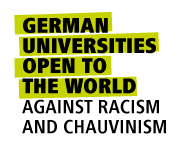
Newsarchiv: Creating knowledge since 1502
Jahr 2020
Forscher entwickeln einzigartige Polymerfasern
Extrem belastbar und zugfest, und dabei zäh und federleicht – Materialien mit dieser außergewöhnlichen Kombination von Eigenschaften werden in vielen Industriebranchen sowie in der Medizin dringend benötigt und sind ebenso für die wissenschaftliche Forschung von großem Interesse. Ein Rezept für die unkomplizierte Herstellung von Polymerfasern mit eben diesen Eigenschaften hat jetzt ein Forschungsteam der Universität Bayreuth gemeinsam mit dem Forschungszentrum Jülich, der Universität Halle und weiteren Partnern in Deutschland, China und der Schweiz entwickelt. In der Fachzeitschrift "Science" stellen die Wissenschaftler und Wissenschaftlerinnen ihre Entdeckung vor.
70 Jahre Musikpädagogik an der Universität Halle – Auftakt zum Festjahr am 13. Januar
Die Abteilung Musikpädagogik, die heute zum Institut für Musik, Medien- und Sprechwissenschaften der Martin-Luther-Universität Halle-Wittenberg (MLU) gehört, begeht 2020 ihr 70-jähriges Gründungsjubiläum. Begangen wird das Jubiläumsjahr auch mit vielfältigen musikalischen Veranstaltungen: Den Anfang macht ein Konzertabend mit Studierenden der Gesangs- und Instrumentalklassen am Montag, 13. Januar 2020, 19.30 Uhr.
Urban growth causes more biodiversity loss outside of cities
The direct effects of urban growth seem to be much smaller than the indirect effects outside of cities, such as the urban release of greenhouse gases causing climate change globally or the increasing demand for food and resources in cities leading to land-use change in rural areas. An international team of researchers including researchers from The Nature Conservancy (TNC), the German Centre for Integrative Biodiversity Research (iDiv), Martin Luther University Halle-Wittenberg (MLU) and other institutions assessed the direct and indirect effects on a global scale. The results have been published in the journal "Nature Sustainability".
Neues EU-Projekt: Stadtnahe Freiflächen erhalten
Geowissenschaftler der Universität Halle koordinieren das neue Interreg-Europe-Projekt "RENATUR - Improving regional policies to better protect natural heritage of peri-urban open spaces". Gemeinsam mit sechs weiteren Partnern in Europa möchte das Projekt auf die Bedeutung von Freiflächen an den Stadträndern aufmerksam machen und vorhandene Politikinstrumente weiterentwickeln, die eine grüne Infrastruktur fördern und die biologische Vielfalt stärken. Über einen Zeitraum von vier Jahren stellt der Europäische Fonds für Regionale Entwicklung dafür insgesamt 1,27 Millionen Euro bereit.
Entrepreneurship: Alliance secures millions in funding for international startup campus
The Universities of Halle, Jena and Leipzig got the joint go-ahead for their International Startup Campus project under the EXIST Business Start-Up Grant initiative run by the Federal Ministry for Economic Affairs and Energy (BMWi). The collaborative project will receive 3.8 million euros in funding from the BMWi. This was announced by the Parliamentary Secretary of State Thomas Bareiss on 3 December at a ceremony held in the Futurium Berlin.
Mitteldeutscher Universitätsbund erhält Millionen-Förderung für "International Startup Campus"
Die Universitäten Halle, Jena und Leipzig erhalten im Verbund vom Bundesministerium für Wirtschaft und Energie (BMWi) im Rahmen der Fördermaßnahme EXIST-Potentiale den Zuschlag für das Vorhaben "International Startup Campus". Das Verbundvorhaben wird vom BMWi mit 3,8 Millionen Euro gefördert.
Periodontal disease: Patent for new treatment method
New biodegradable rods promise to provide better treatment for periodontal disease. Researchers from the Institute of Pharmacy at Martin Luther University Halle-Wittenberg (MLU) have re-combined an already approved active ingredient and filed for a patent for their invention together with two Fraunhofer Institutes from Halle. The innovation would spare patients from having many side effects. Their findings were published in the "International Journal of Pharmaceutics".
Gene therapy: Development of new DNA transporters
Scientists at the Institute of Pharmacy at Martin Luther University Halle-Wittenberg (MLU) have developed new delivery vehicles for future gene therapies. A team of researchers led by Dr Christian Wölk are using artificial fats to transport DNA into cells. The scientists demonstrate how well this technique works in a study conducted in collaboration with pharmacists from the University of Marburg. The study has been published in "Biomaterials Science".
Städtewachstum verursacht stärksten Verlust der biologischen Vielfalt außerhalb der Städte
Die direkten Folgen des Städtewachstumes sind anscheinend weitaus geringer als die indirekten Auswirkungen außerhalb der Städte. Dazu gehören die Freisetzung von Treibhausgasen, die weltweit zu einer Veränderung des Klimas führen, oder der zunehmende Bedarf an Lebensmitteln und anderen Ressourcen, der eine veränderte Landnutzung zur Folge hat. Ein Forscherteam von der Naturschutzorganisation The Nature Conservancy (TNC), dem Deutschen Zentrum für integrative Biodiversitätsforschung (iDiv), der Universität Halle und anderen Forschungseinrichtungen hat die direkten und indirekten Auswirkungen des Städtewachstums auf globaler Ebene untersucht.
Stadtgärten: Zwischen Gemüseanbau und Politik
Besonders in dicht besiedelten Gebieten Deutschlands ist Gärtnern ein wachsender Trend. Genauer das Gärtnern in sogenannten Gemeinschaftsgärten. Ihre Zahl hat sich in den letzten fünf Jahren verdoppelt. Eine Studie von Wissenschaftlerinnen der Universität Halle in Zusammenarbeit mit der Fachhochschule Münster zeigt, dass die Mitglieder viel voneinander lernen und es um mehr geht als Gemüse. Der Garten ist eine Möglichkeit der Teilhabe und Mitbestimmung. Ist die Gruppe allerdings sehr bunt, wird es schwieriger.
Jahr 2019
News
Im neu eingerichteten Sonderforschungsbereich (SFB) 1423 „Strukturelle Dynamik der GPCR-Aktivierung und Signaltransduktion“ geht es um die Kommunikation von Zellen über Rezeptoren in der Zellmembran. Der von der Deutschen Forschungsgemeinschaft (DFG) geförderte SFB wird an der Universität Leipzig koordiniert, Prof. Dr. Andrea Sinz vom Institut für Pharmazie der Universität Halle leitet ein Teilprojekt. Dabei soll insbesondere die Interaktion von Neuropeptid Y, einem Botenstoff der unter anderem an der Steuerung von Hunger und Angst beteiligt ist, mit bestimmten Rezeptoren untersucht werden.
News
Neuartige bioabbaubare Stäbchen versprechen eine besser verträgliche Behandlung von Parodontitis. Dafür haben Forscher vom Institut für Pharmazie der Universität Halle einen bereits bekannten Wirkstoff neu kombiniert und diese Erfindung zusammen mit Fraunhofer-Einrichtungen aus Halle zum Patent angemeldet. Patienten könnten damit viele Nebenwirkungen erspart werden. Die Ergebnisse dazu wurden in der Fachzeitschrift "International Journal of Pharmaceutics" veröffentlicht.









